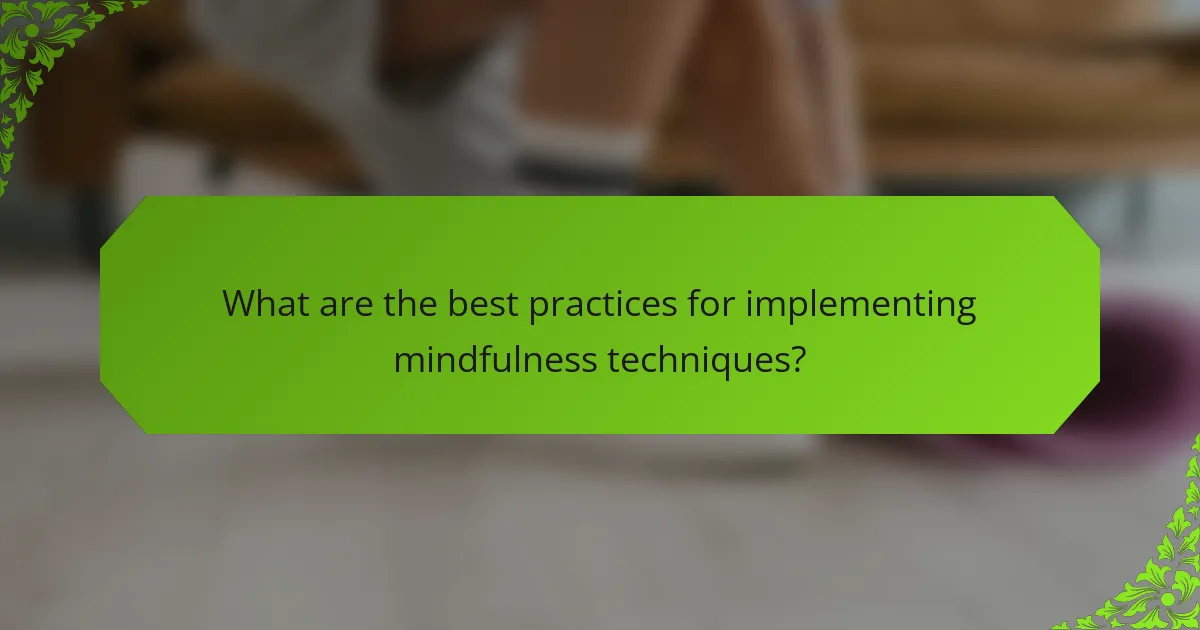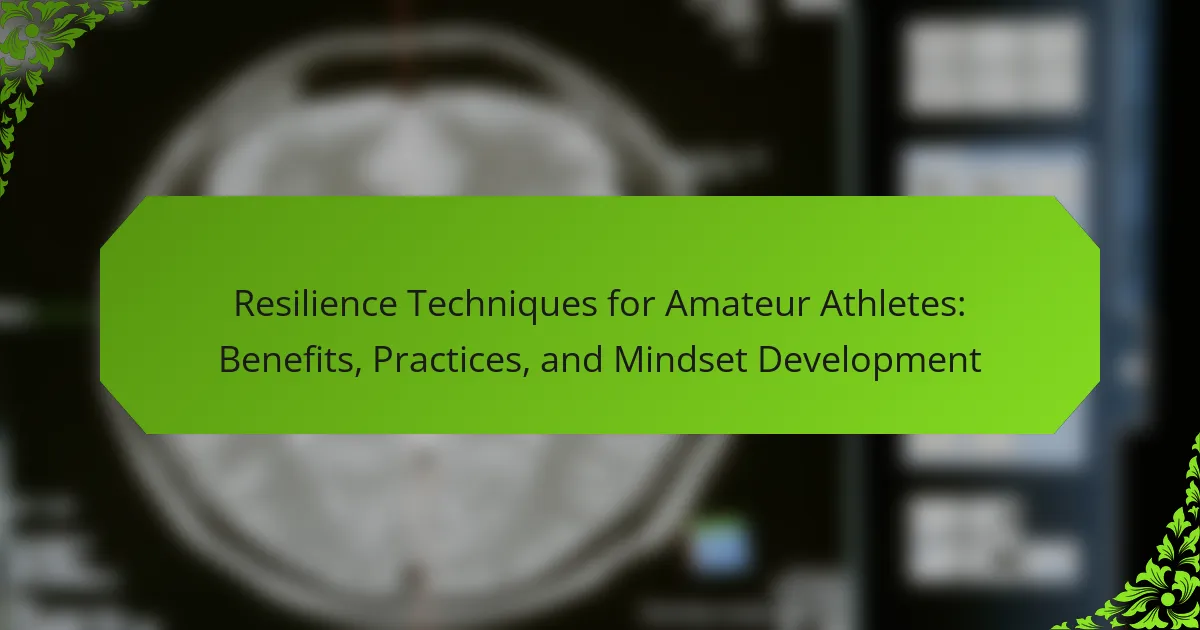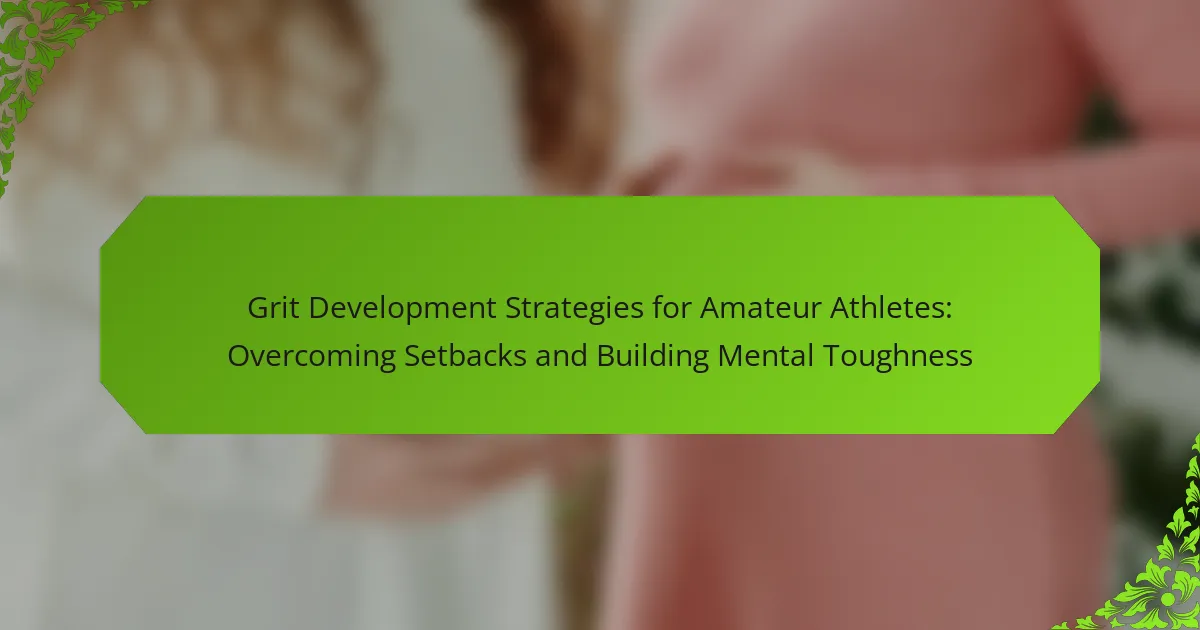Mindfulness techniques significantly enhance focus and resilience for amateur athletes facing stress. Key practices include breathing exercises, body scans, and visualization to improve concentration and mental clarity. Regular integration of these techniques into training routines fosters emotional regulation and boosts confidence. By adopting mindfulness, athletes can effectively manage pressure and improve their overall performance.

What are mindfulness techniques for amateur athletes?
Mindfulness techniques for amateur athletes enhance focus, reduce stress, and build resilience. Techniques include breathing exercises, body scans, and visualization.
Breathing exercises, such as deep diaphragmatic breathing, promote relaxation and improve concentration. Body scans help athletes become aware of physical sensations, fostering a connection between mind and body. Visualization techniques involve imagining successful performances, which can boost confidence and reduce anxiety.
Regular practice of these techniques can lead to improved athletic performance and mental well-being. By integrating mindfulness into training, amateur athletes can cultivate a resilient mindset that supports their goals.
How do mindfulness techniques help in stress reduction?
Mindfulness techniques significantly aid in stress reduction for amateur athletes by promoting mental clarity and emotional regulation. These practices, such as meditation and focused breathing, enhance resilience by allowing athletes to manage anxiety and improve focus during performance. Research indicates that consistent mindfulness training can lead to a noticeable decrease in stress levels, fostering a more positive athletic experience. Engaging in mindfulness not only benefits mental health but also supports physical performance, making it a valuable tool for athletes seeking to improve their overall well-being.
What role does mindfulness play in resilience building?
Mindfulness significantly enhances resilience in amateur athletes by promoting stress reduction and emotional regulation. Techniques such as focused breathing and body scanning help athletes remain present, reducing anxiety during competition. Research shows that regular mindfulness practice can improve focus and adaptability, essential traits for overcoming challenges. Additionally, mindfulness fosters a positive mindset, which contributes to long-term resilience.

What are the universal attributes of mindfulness techniques?
Mindfulness techniques universally promote awareness, focus, and emotional regulation. Common attributes include breath control, body scanning, and visualization. These practices enhance mental clarity, reduce stress, and build resilience in amateur athletes. Unique aspects may involve personal adaptation of techniques to fit individual needs.
How can breathing exercises enhance performance?
Breathing exercises significantly enhance performance by improving oxygen delivery and reducing stress. These techniques help amateur athletes cultivate focus and resilience, which are essential for peak performance. Studies indicate that controlled breathing can lower heart rate and anxiety levels, enabling athletes to maintain composure during competitions. This practice fosters a unique attribute of mental clarity, allowing for better decision-making and execution of skills under pressure. Regular integration of breathing exercises into training routines can lead to notable improvements in overall athletic performance.
What is the impact of visualization on athletic success?
Visualization significantly enhances athletic success by improving focus and mental resilience. Athletes who regularly practice visualization techniques report increased confidence and reduced anxiety. Research indicates that mental imagery can lead to better performance outcomes, as it primes the mind for actual competition. This mental rehearsal allows athletes to visualize successful execution of skills, fostering muscle memory and strategic thinking. Additionally, visualization serves as a powerful tool for stress reduction, enabling athletes to maintain composure under pressure.
How does body awareness contribute to athletic training?
Body awareness significantly enhances athletic training by improving focus and reducing stress. Mindfulness techniques foster a deeper connection between the mind and body, enabling athletes to recognize physical sensations and emotional responses. This awareness leads to better performance, as athletes can adjust their techniques and strategies in real time. Additionally, being mindful during training helps build resilience, allowing athletes to cope with challenges and setbacks more effectively. Studies show that athletes who practice mindfulness report lower stress levels and improved overall well-being, contributing to their success in sports.

What unique mindfulness techniques can amateur athletes adopt?
Amateur athletes can adopt unique mindfulness techniques such as visualization, body scanning, and mindful breathing to enhance focus and reduce stress. These practices cultivate mental resilience, essential for performance improvement.
Visualization involves imagining successful outcomes, which can boost confidence and motivation. Body scanning helps athletes connect with their physical sensations, promoting awareness and relaxation. Mindful breathing techniques can regulate emotions, aiding in stress management during competition.
Incorporating these techniques into training routines can lead to improved athletic performance and overall well-being. Regular practice fosters a positive mindset, enabling athletes to handle challenges effectively.
How can journaling improve mental clarity and focus?
Journaling enhances mental clarity and focus by facilitating self-reflection and organization of thoughts. This practice allows amateur athletes to process emotions and reduce stress, leading to improved resilience and performance. Regular journaling can also identify patterns in training and mindset, fostering a deeper understanding of personal goals and challenges. As a result, athletes experience heightened concentration during their activities.
What are the benefits of mindful eating for athletes?
Mindful eating enhances athletes’ performance by promoting better focus, reducing stress, and fostering resilience. By concentrating on food choices and eating habits, athletes can improve digestion and energy levels. This practice encourages awareness of hunger cues, leading to optimal nutrition and recovery. Additionally, mindful eating can decrease anxiety related to competition, enhancing mental clarity and emotional stability. Overall, it supports a balanced approach to training and nutrition, vital for long-term athletic success.

What rare attributes of mindfulness techniques may benefit athletes?
Mindfulness techniques can enhance athletes’ performance through unique attributes like enhanced focus and emotional regulation. These rare benefits help athletes manage pressure and recover from setbacks. For example, visualization techniques can improve mental imagery, fostering resilience. Additionally, breath control practices uniquely influence heart rate variability, promoting calmness under stress.
How can nature immersion enhance mindfulness practices?
Nature immersion significantly enhances mindfulness practices by fostering a deep connection to the environment. Engaging with nature reduces stress levels, promoting relaxation and mental clarity. This connection can improve focus, allowing amateur athletes to build resilience and cope with challenges effectively. Exposure to natural settings has been shown to lower cortisol levels, which is critical for stress management. Additionally, the sensory experiences in nature, such as sounds and sights, can deepen mindfulness, enhancing overall performance in sports.
What are the effects of sound therapy on athletic performance?
Sound therapy enhances athletic performance by reducing stress and improving focus. It fosters mindfulness, leading to better resilience and mental clarity during competition. Studies indicate that sound frequencies can lower anxiety levels, which directly impacts an athlete’s ability to perform under pressure. Additionally, incorporating sound therapy into training routines can help athletes recover faster, as it promotes relaxation and aids in muscle recovery. Overall, sound therapy serves as a valuable tool for amateur athletes seeking to enhance their performance through mindfulness techniques.

How can different cultures influence mindfulness practices for athletes?
Different cultures shape mindfulness practices for athletes by integrating unique philosophies and techniques. For instance, Eastern traditions emphasize meditation and breathing exercises, fostering mental clarity. In contrast, Western approaches often focus on cognitive strategies and goal-setting. These cultural differences enhance stress reduction and resilience in athletes, tailoring mindfulness practices to their backgrounds. Incorporating diverse techniques can lead to more comprehensive training regimens, promoting overall well-being and performance.
What mindfulness techniques are popular among athletes in different regions?
Mindfulness techniques popular among athletes vary by region but focus on stress reduction and resilience. In North America, visualization and breathing exercises are common, helping athletes manage anxiety. European athletes often practice yoga and meditation, fostering mental clarity and focus. In Asia, particularly in Japan, mindfulness incorporates traditional practices like Zen meditation, enhancing concentration. Australian athletes frequently engage in nature-based mindfulness, utilizing outdoor settings to improve mental well-being. Each technique aligns with regional cultural values while promoting overall athletic performance.

What are the best practices for implementing mindfulness techniques?
To implement mindfulness techniques effectively, amateur athletes should focus on consistency, simplicity, and integration into their training routine. Regular practice enhances stress reduction and builds resilience. Start with short sessions, gradually increasing duration. Incorporate breathing exercises, body scans, or visualization techniques before and after workouts. Track progress to maintain motivation and adapt techniques as needed. Engaging in group mindfulness sessions can also foster community support and accountability, enhancing the overall experience.
How can athletes create a personalized mindfulness routine?
Athletes can create a personalized mindfulness routine by identifying their unique stressors and needs. Start with short daily sessions focusing on breath control, visualization, or body scans. Gradually increase duration and complexity based on comfort and effectiveness. Incorporate mindfulness techniques into training sessions, such as mindful running or yoga. Regularly assess progress and adjust the routine to enhance resilience and reduce stress.
What steps should be taken to integrate mindfulness into training?
To integrate mindfulness into training, athletes should follow a structured approach. First, establish a regular practice schedule, dedicating time for mindfulness exercises daily. Next, incorporate breathing techniques to enhance focus and reduce anxiety during training sessions. Additionally, use visualization strategies to mentally rehearse performance, fostering resilience. Finally, encourage reflection through journaling to assess progress and emotional responses, reinforcing the mindfulness habit.
What common mistakes should athletes avoid when practicing mindfulness?
Athletes should avoid distractions, unrealistic expectations, and neglecting consistency when practicing mindfulness. Distractions can hinder focus, while unrealistic expectations may lead to frustration. Consistency is crucial for building resilience and reducing stress effectively. Additionally, overlooking the importance of self-compassion can impede progress.
What expert insights can enhance mindfulness practices for athletes?
Integrating expert insights can significantly enhance mindfulness practices for athletes. Techniques such as focused breathing, visualization, and body scanning can improve stress reduction and resilience. Research indicates that these methods can lead to better performance and mental clarity, especially under pressure. Regular practice fosters a unique attribute of heightened self-awareness, enabling athletes to respond effectively to challenges. Additionally, incorporating mindfulness into training routines can create a rare synergy between physical and mental conditioning, ultimately enhancing overall athletic performance.


